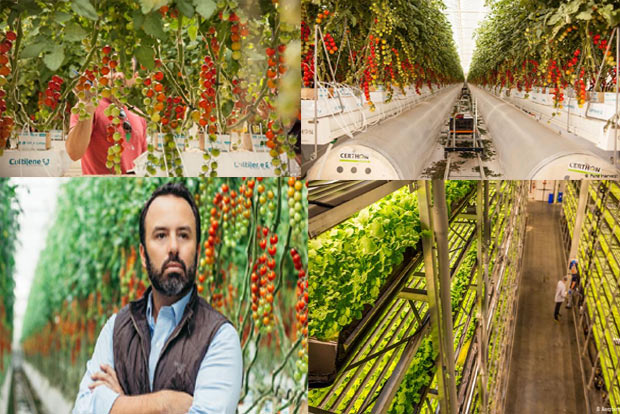Begin typing your search...
Answers fro parched earth: Agri in desert - Are vertical farms a solution to save water?
“When I told people I was going to grow tomatoes in the desert, they thought I was crazy,” Sky Kurtz, founder of Pure Harvest Smart Farms, said.

Chennai
With just an average 12 days of rain a year, less than 1% arable land, a desert location and an 80% import rate for food, the UAE seems an unfavourable place to set up a farm. Kurtz is one of several entrepreneurs using high-tech farming techniques to boost crop production in the Emirates. Pure Harvest built the first climate-controlled greenhouse in Abu Dhabi in 2017.
Prompted by arid conditions and a desire for greater food security, the country is investing millions in technologies — such as vertical farming — that could make it an unlikely agricultural pioneer. Vertical farms can grow a rich variety of different crops by stacking them in layers under LED lighting in climate-controlled greenhouses and watering them with mist or drip systems. The process is tailored to each crop’s specific needs, resulting in high-yield, year-round harvests.
“It takes 30 to 40 days to grow leafy greens out in the field. We can grow that same crop in 10 to 12 days,” says Marc Oshima, co-founder of Aerofarms. The company received funding from the Abu Dhabi Investment Office to build the capital’s largest indoor vertical farm, with 800 different crops, by 2021. The technology uses minimal land and up to 95% less water than conventional agriculture. The hydroponics system places the plants’ roots directly into a water-based and nutrient-rich solution instead of soil. This “closed loop” system captures and recirculates all the water, rather than allowing it to drain away — useful for a country like the UAE suffering from extremely high water stress. Globally, agriculture accounts for 70% of freshwater withdrawals, and UAE is extracting groundwater faster than it can be replenished, according to the International Center for Biosaline Agriculture (ICBA).
“Water is very expensive over in the UAE, but energy is cheap as it is subsidized,” says Jan Westra, a strategic business developer at Priva, a company providing technology to vertical farms. The artificially controlled environment is energy intensive because the air conditioning and LED lights need a constant source of electricity. This bringing forth of life in the desert could come at a high environmental cost. Most of that energy comes from carbon-emitting fossil fuels, even as the Middle Eastern country feel the effects of climate change. By 2050 Abu Dhabi’s average temperature is predicted to increase by around 2.5°C in a business-as-usual scenario. Over the next 70 years patterns of rainfall are also expected to change.
Integrating renewable energy
Although Pure Harvest is building a solar-powered farm in neighboring Saudi Arabia, its UAE operations get electricity from the carbon-intensive national grid. Investing more in renewables “is a goal of ours,” Kurtz said. He said the company has not set a clean energy target but is working on various green power projects, including a plan to integrate solar power generated in UAE into its operations. However, Willem van der Schans, a researcher specialising in short supply chains at Wageningen University in the Netherlands, says sustainability and clean energy should be “inherent in the technology and included in plans when starting a vertical farm.” He argues that many vertical farming companies are not sustainable in terms of energy as they still view clean power as an optional “add-on.” Ismahane Elouafi, director general of the government funded ICBA in Abu Dhabi, acknowledges that vertical farming has some way to go before achieving “real sustainability,” but she believes the innovations are “promising.”
Improved battery storage, increasingly efficient LED lights and cheaper solar panels will help, she adds.
— This article has been provided by Deutsche Welle
Visit news.dtnext.in to explore our interactive epaper!
Download the DT Next app for more exciting features!
Click here for iOS
Click here for Android
Next Story



